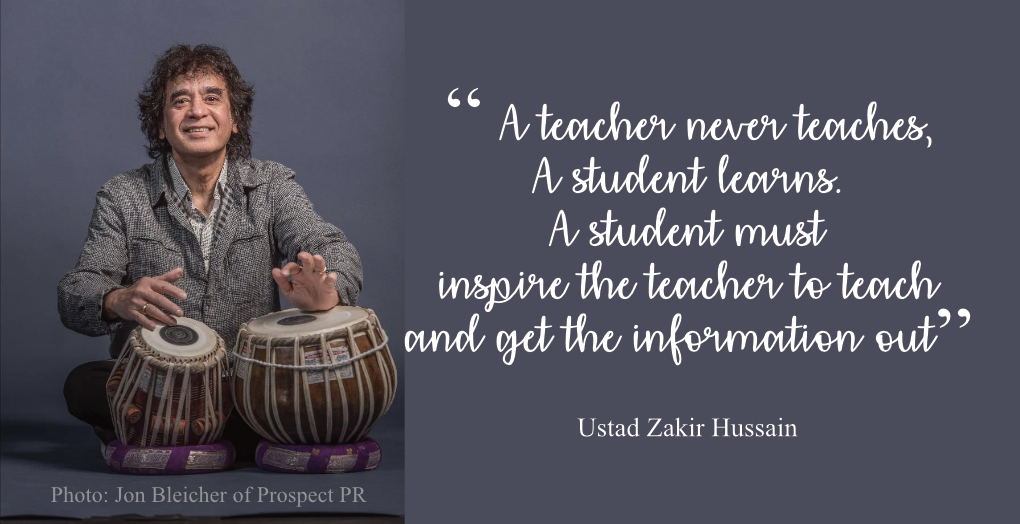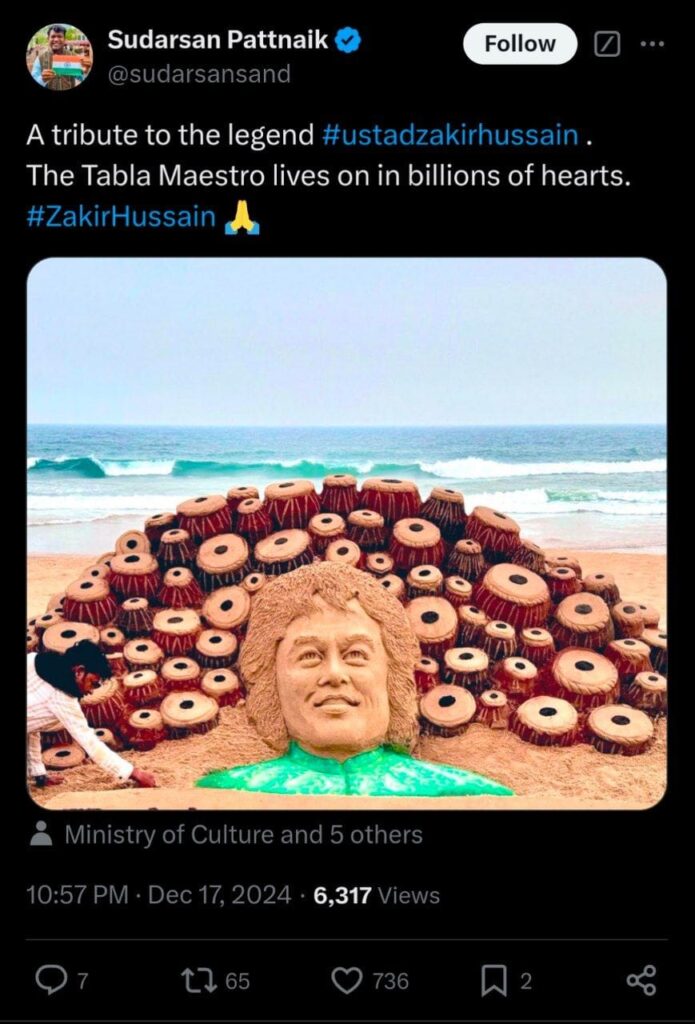The music world is lurching from the loss of a true musical titan. Ustad Zakir Hussain, whose name became a lighthouse in the realm of tabla, left us on December 16, but the rhythm of his life continues to thump through the hearts of many. The maestro’s contribution was not just about captivating performances but building connections, sharing wisdom, and inspiring countless others. In this feature, we delve beyond the accolades and the stage lights, capturing the heartfelt stories of those who shared a moment, a melody, or a lifetime with him.

From the passionate musicians who revered him as their mentor to those moved by his spirit from afar, each voice contributes to a vibrant tapestry of memory. In a landscape where traditional learning meets modern tutorials, Hussain’s unique approach invites us to reflect on the future of music education. Join us for this interesting read, in which The Voices celebrates the life of Ustad Zakir Hussain—a symphony of memories, love, and an everlasting impact on the world of music.
Gurukul Tradition: The Teacher imparts Personalised Training
In the Gurukul system, a student resides with the guru. Absorbs not only the technical details but also the nuances of discipline, ethics, and performance. The holistic approach of this system allows the student to foster a lifelong bond with the instrument, music, and the teacher. It builds a firm foundation.

V. Amruth Kumar, a tabla teacher at Ghantasala Venkateswara Sangeet Uccha Kala Shala in Vijayawada, spoke affirmatively about the practice taught in the Gurukul tradition. He learned from Tabla Nawaz Shaik Dawood of the Hyderabad Gharana. He emphasised, “Music must be taught by a guru; otherwise, the nuances of music cannot be properly corrected. Even if the guru is present virtually, one cannot achieve the needed clarity.”
Online Music Education: A Land of Opportunities
The online medium of learning opens up a world without boundaries. It is the best that can happen if one can learn from the online medium. It makes education accessible.
Bandela Nithya Prakash, 17, a student of the Ghantasala Venkateswara Sangeet Uccha Kala Shala, Vijayawada, started learning music first through keyboard 7 years ago. After learning tabla for 6 years at the music school, he feels that physical attention given by a teacher is much needed while learning music. The mistakes are rectified immediately. Technical issues like video/audio quality while learning online may also hamper the output. Lifelong learning is what he wishes to take away from Ustad’s life.

A Much-Needed Guru
Another student, Nelapatla Dileep, 25, started learning through online music videos. He quickly understood that playing pads differs from learning classical music, which requires a teacher.
After superannuation, a retired bank manager, V V Raghuvulu, enrolled in music school to fulfil his dream of understanding music correctly and getting some peace in his life. He underlines the need for a guru, especially for learning music. It affirms that music can be correctly learned only through contact classes and not virtually. Raghuvulu swears by Ustad Zakir Hussain’s lesson that music has no age or background.

An Admirer for Life
A member of the Threeory band, M S Pavan Kumar, an All India Radio-‘A’ Grade tabla artiste, remembers Hussain’s name being synonymous with tabla. Pavan has been playing tabla since the age of three. He says that Hussain made the tabla a solo instrument to be played for ghazals and western symphonies along with the vocals. “Very few musicians could do Jugalbandi in Carnatic music with mridangam, kanjira, and ghatam. And Hussain Ji did that just effortlessly,” he says.
Being a tabla player himself for the past 30 years, Pavan Kumar, a disciple of Ustad Shabbir Nisar (son of Tabla Nawaz Shaik Dawood), considers himself insignificant to address Ustad ji and talk about his music. “He is an inspiration for generations to come. He will be missed dearly. I bow down to the great legend,” he adds.
Meeting the Master
Pavan says he is fortunate to have met Zakir Hussain Ji. He remembers it being a surreal experience to meet modest and humble Hussain with a contagious smile. “My Ustad and others mentioned that great maestros like Pandit Shiv Kumar Sharma and Pandit Hari Prasad Chourasia ji would say that if Zakir Bhai performed with them, it elevated their music. He had captured the beats of tabla in all its form and format. He could play 16 or 15 beats taal, be it 6.5, 18 or 13 beats taal with any performer. His chaumukhi (all-round) persona will live on through his music,” says Pavan.

The Music is the Teacher
Irfan Ahmed Khan, a sitar player for 25 years and a member of the Threeory band, says, “I was very sad and shocked to hear about the inteqal of Zakir Ji. To talk about Ustad Zakir Hussain is like talking about our prophet. What Pandit Ravi Shankar is to Sitar, Zakir Hussain is to tabla. During a visit to the USA on a ride in the Metro, one person asked me what I do, and I said I learn and play Hindustani classical music; his response was – Oh Zakir Hussain!”
The King of Versatility
Remembering his learning with his father, Basheer Ahmed Khan (Senior disciple of Ustad Vilayat Khan Saab), he reminisces, “I have adored Ustad Ji all my life, and at one point of time I even copied and flaunted his hairstyle. Every musician has a particular style, but Zakir Ji was the king of versatility. Once my father got a cassette of Zakir ji playing tabla with Ustad Vilayat Khan Saab; it was a very basic 16 taal, as Khan Saab preferred. And in another, he witnessed Zakir Ji’s performance with Pandit Hariprasad Chaurasia ji and Pandit Shivkumar Sharma Ji.”
He remembers being in awe that one person could play such complicated and basic music with the same panache. “Ustad Ji would be a delight to perform with, said the maestros, as he would mould and adapt to their musical requirements, be it simple or powerful. The world has lost a great musician, and I have lost a Guru,” he says.

Remembering the Ustad!
Rajesh Kunkawlekar, the creative head for an ad agency in Mumbai, had the chance to meet the maestro while he worked as a designer at Times Music. He had worked on a few album cover designs for Zakir. He reminisces of being completely mesmerised by the charismatic and down-to-earth Hussain. “Ustad Ji had a warmth in his words too, just like his music. Whenever there were corrections to the design, he would very politely ask me to do the changes—may it be colour, image, or font. He was very involved in the work. He had a divine aura, which I am blessed to have felt. My heartfelt farewell to the maestro.” Kunkawlekar fondly remembers.
Ustad Zakir Hussain’s Point of View
As we go through the excerpt from the telephonic interview of Ustad Zakir Hussain with Dr. T Prasad (he is currently working as the Chief Operating Officer of a lifestyle portal in Dallas, Texas, USA), Ustad Zakir Hussain comes across as a protagonist who championed both traditional and modern educational paradigms. He shares in the interview that learning music through distance mode, like for the ragas, rhythms, and what musicians are, is possible. The academic elements can be studied on the internet. However, once the student gets to the point where he has the talent to become semi-professional or professional, he must receive a one-on-one transmission from a specialised teacher with in-depth knowledge of the performance level.

On Learning from Great Masters
Reminiscing about Ustad’s comment that he once made at a talk on Google stated that. “For me, it’s been great to be able to hear music of the old masters that has been on YouTube. And it’s like, I wonder, where did these people find this? I mean, there’s a lot of stuff, and I listen to it, and that’s like gems that I can learn from, that I can take information from, glean information from, and just develop my repertoire further and further. With the presence of great masters from the 1930s, ’40s, and ’50s on YouTube, it has become a great learning tool. So I have to say that in that sense, YouTube has more positives than negatives.”

The Future of Music Education: Integrating Tradition with Technology
The amalgamation of online learning with traditional methods such as Gurukul or music schools will continue to offer a holistic learning approach to music students. Online platforms can only create interest and provide foundational knowledge and theoretical understanding. A teacher’s personalised mentorship helps students receive instructions that hone their skills to professional standards. Online teaching/learning makes music education more accessible, while a teacher’s physical presence boosts the student’s confidence and helps develop the finer qualities of a performer.
Taking a cue from the maestro, we can be assured that the harmonious blend of embracing both traditional and modern methods can enrich the learning experience and preserve the sanctity of any art form and not just music.
Copy Editor: Megha Mann

